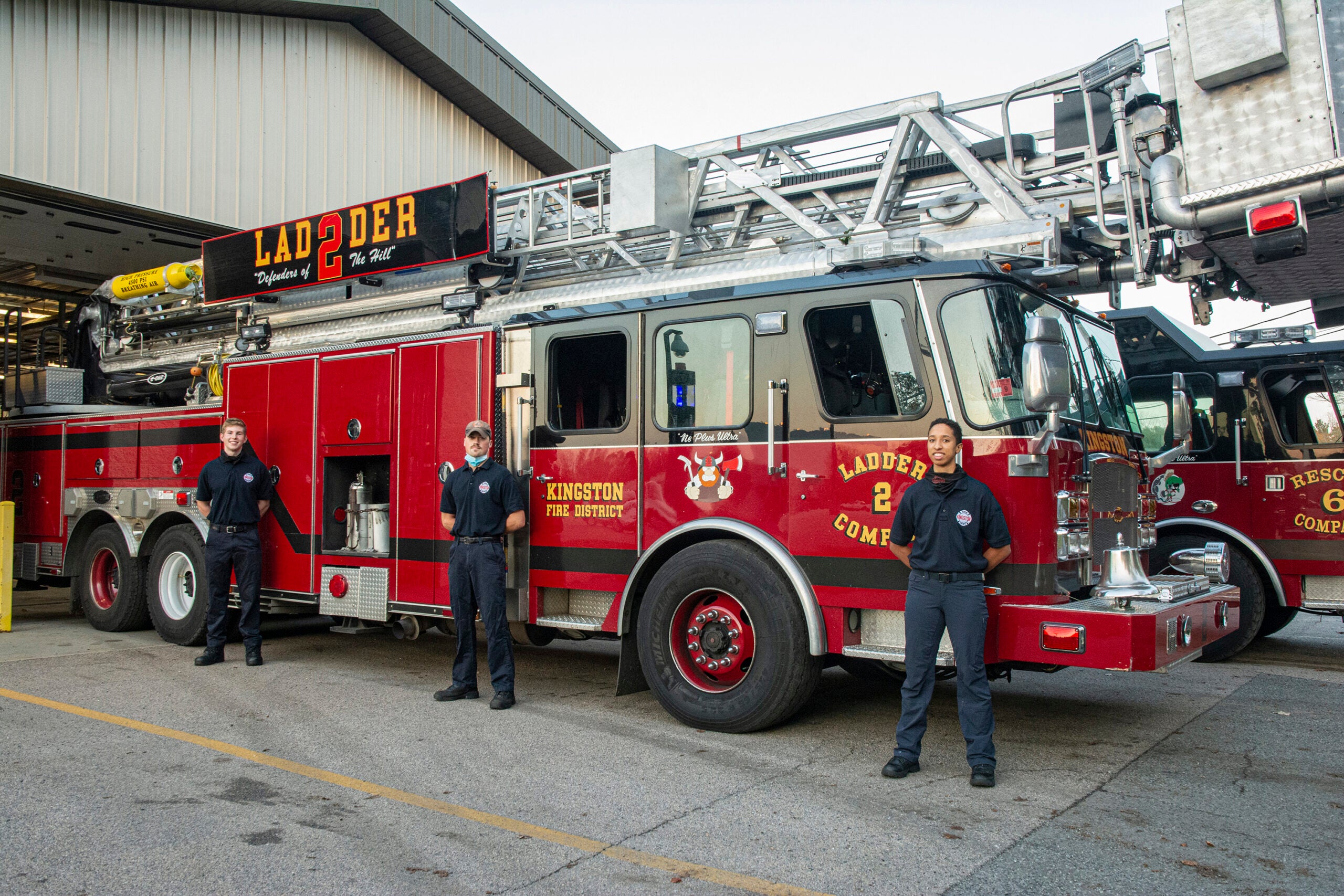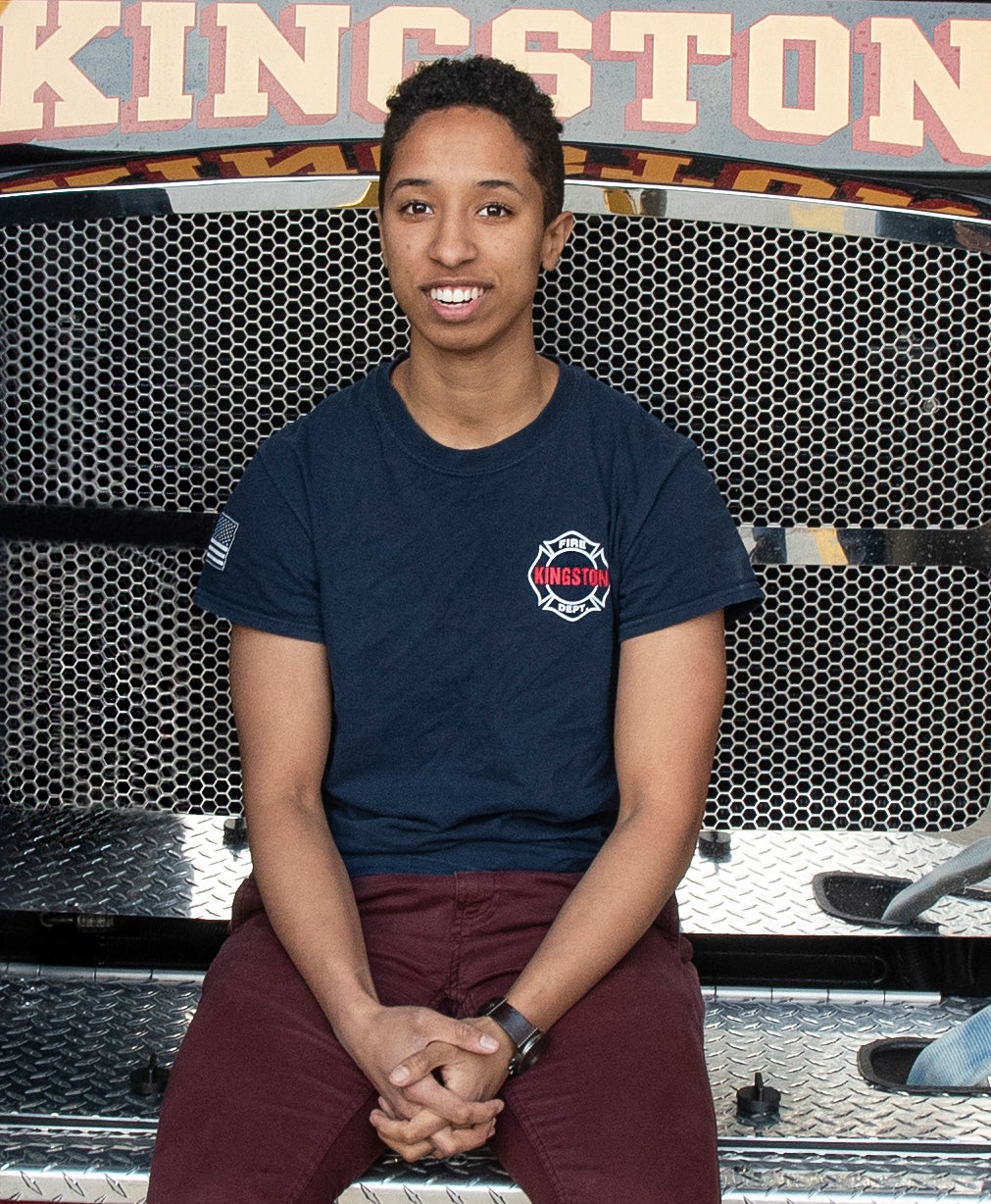KINGSTON, R.I. — Dec. 28, 2020 — Rachel Gomes, of Milford, Connecticut, came to the University of Rhode Island to earn a master’s degree in environmental science and management. But she had no idea that she would break barriers and go where no woman has gone before in Kingston Fire Department history. She recently became the first female firefighter to be cleared for primary duty at the all-volunteer department.
Gomes, who earned her master’s degree earlier this year, describes herself as an athletic person who loves helping the community and challenges herself physically. However, she never planned to be a firefighter, but while at URI, she realized she needed an additional challenge.
“I felt like I needed to gain more skills that classic education wasn’t going to give me,” Gomes said. “I wanted to challenge myself, learn how to react to stressful situations, and learn practical skills. I saw that the fire district needed student volunteers, thought it was the perfect opportunity, and signed up.”
The Kingston Fire Department is always seeking volunteers, but getting cleared for primary duty, which enables a firefighter to drive the fire engines and platform truck, takes hard work and extensive training.

“Rachel is extremely well-trained, adaptive and can handle stressful situations very well. She has those innate characteristics that every firefighter has,” Kingston Fire Chief Nate Barrington said. “This is a historically male dominated field, and having people like Rachel who possess those traits and are hardworking is a proud moment for us and the field.”
Student volunteer firefighters go through months of training to be cleared for different levels of duty. The training period is physically challenging and stressful.
Despite being 5 feet, 5 inches tall and weighing 125 pounds, Gomes says her comparatively small build never stopped her from accomplishing difficult tasks at the station, as she found creative ways to complete them successfully.
“I had to approach problems differently than my male fellow colleagues would generally approach them,” Gomes said. “Some people muscle through it, but smaller people like myself have to strategize. For example, to grab the ladder, you would typically go in the middle where the balance point is and just take it out, but I’ll start from the back and work it to the middle so that I’m not pulling the full portion of the ladder. Little tricks like that help me.”
One of the first questions Gomes asked before applying to be a volunteer firefighter was if there were any other women involved. Though she received a disappointing answer, she was determined to be a part of it.
“I knew it was going to be a challenge but I still wanted to do it,” she said. “There are female firefighters around but not here. It is different keeping up with an environment with guys twice my size. But you definitely have to work harder and find different ways that work for you and ways to compliment others here.”
Volunteer firefighters respond to almost all kinds of emergency calls, participate in drills with predetermined and controlled live fire, and learn how to work the engines, navigate through buildings during emergencies, and drive the ladder trucks. They are also trained to respond to medical emergencies and hazardous materials situations.
According to Erik Brierly, recruitment coordinator at the Kingston Fire Department, the training period consists of two levels–the applicant and probation packet. The trainees start with the pick up, heavy rescue, engine, and finally, ladder training.
“There are plenty of grown men, adults and fit guys I have seen that don’t make it through the training,” Brierly said. “Rachel has gone through the same training that we’ve all gone through. The weight of the ladders or hoses don’t change, temperatures don’t change. But she finds what works for her and makes it work very well.”
Apart from learning life skills and how to respond to high-stress situations, Kingston volunteer firefighters also benefit from a few incentives.
URI student volunteers can live at the fire station rent-free in return for maintaining “on-call” volunteer coverage, seven days a week. They are also eligible for tuition reimbursement of up to $3,000 a semester. Moreover, textbook fees and other school expenses are also reimbursed when the volunteers meet certain benchmarks. Gomes took advantage of all of these while she was in graduate school.
“Thanks to the Staffing for Adequate Fire and Emergency Response grant, these students can balance their school work as well as volunteering here,” Brierly said. “This grant helps us increase recruitment and retention. Even if they are not a URI student and if they take an online class, we’ll give them a reimbursement. What they get from the education reimbursement is what we get from their retention.”
Like Gomes, the volunteer program also significantly influenced the careers of other URI students from various diverse backgrounds.
“It’s a huge perk that I can say that I can drive the trucks and respond to emergency calls at a young age,” said Robert Davis, a junior majoring in biology in the Doctor of Pharmacy program. “I want to incorporate this with my career. You’ll always find a fire department where you live. Reaching out to them and being a part of something that has a significant impact on the community is what I would like to continue doing in the future.”
Gomes sees her experience at the station as an unparalleled opportunity to challenge her, learn how to respond to stressful situations and develop practical and leadership skills.
“If you want to be here, then you’ll feel like you belong here and I have never been made to feel otherwise,” Gomes said. “I definitely encourage others, especially women, to sign up. It might seem intimidating but once you get here, you won’t feel that way.”
Edhaya Thennarasu, an intern in the Marketing and Communications Department at URI and Communications major, wrote this press release.

